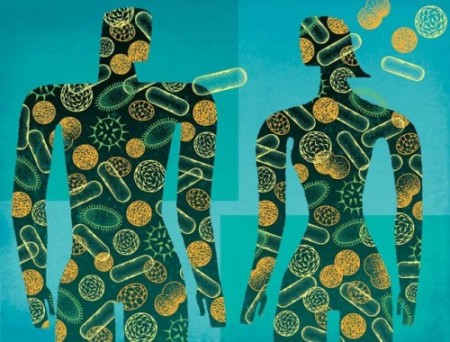 Posted March 13, 2015 | Nutrition & Health Tips
Posted March 13, 2015 | Nutrition & Health Tips
We carry 100,000 trillion bacteria around with us everyday. There are more bacteria in our bodies than human cells! I know what you might be thinking, aren’t these organisms bad and make us sick? While certain species can make us sick some can be beneficial. These beneficial organisms are symbiotic bacteria that provide nutrients, aid in digestion and absorption, inhibit growth of pathogenic species, stimulate the immune response, and improve GI health. It is when there is a shift from mostly beneficial to bad bacteria that there are problems.
This shift in concentration is called dysbiosis and can cause increased gut permeability, cancer risk, and GI infections. When there are more pathogenic species in the gut during dysbiosis they release toxins, carcinogens and antigens that can cause cell damage. The damage to the gut leads to increased gut permeability that allows molecules from inside the gut to enter into circulation. Some signs and symptoms of dysbiosis are nausea, vomiting, bloating, diarrhea, and cramping.
Dysbiosis is linked to several factors including Crohn’s Disease, Celiac Disease, food allergies, Autism, Hyperactivity Disorders, high-refined carbohydrate diets, and long-term antibiotic use. So how can you help your beneficial bacteria flourish? The answer is simple, through nutrition. Maintaining a well-balanced diet with a variety of vegetables and fruit and minimizing or eliminating processed food is important, but there are also additional foods that can help nourish your beneficial bacteria. Prebiotics are a component of food that we do not digest, but the bacteria in our gut thrive on to promote growth and proliferation.
Fuel Your Bacterial Growth With these Foods:
Prebiotics
Probiotics
In a healthy digestive system, prebiotic food can be a great addition to the diet to promote and maintain a balanced bacterial environment. However, prebiotic foods may not be suitable for everyone, especially for those with a weakened or damaged GI tract or those that are on a medically prescribed diet. To discuss which pre- or probiotics foods are right for you, contact us to set up an appointment and we will help guide you through appropriate recommendations based on your needs.
Recipe Ideas
For a more in-depth look at fermented foods and more recipe ideas, visit our previous blog post!
Sources:Walker and Lawley. Pharmacological Research 69: 75-86, 2013
This Post Has 0 Comments